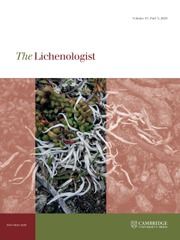Article contents
Pertusaria christae is a synonym of P. saximontana
Published online by Cambridge University Press: 22 August 2006
Extract
During fieldwork in Siberia and Alaska the senior author has sporadically found an unusual Pertusaria species that was tentatively identified as P. christae Dibben & Poelt. This species has been described from a few localities in the Austrian Alps (Dibben & Poelt 1987) and was recently recorded from the Putorana Plateau in Russia (Zhurbenko 1996). Examination of various herbarium collections confirmed that the species is more widely distributed in the Holarctic, but probably overlooked. Further, its distinction from P. saximontana was unclear. According to the literature, P. saximontana is a corticolous or lignicolous species occurring in North America and containing 2-O-methylconfluentic acid (Dibben 1980; Lumbsch et al. 1999; Wetmore 1967). In contrast, P. christae is regarded as a muscicolous or terricolous Eurasian species containing 2′-O-methylperlatolic acid (Dibben & Poelt 1987). In micromorphological features the two species are very similar, and habitat and chemistry were the main characteristics used to separate the two taxa. In our studies, however, we found 2′-O-methylperlatolic acid in several lignicolous collections from North America, raising the question whether the two species are distinct. Hence, we have studied additional material, including the types of both species to clarify the status of the two described taxa.
- Type
- Short Communications
- Information
- Copyright
- © British Lichen Society 2006
- 4
- Cited by




